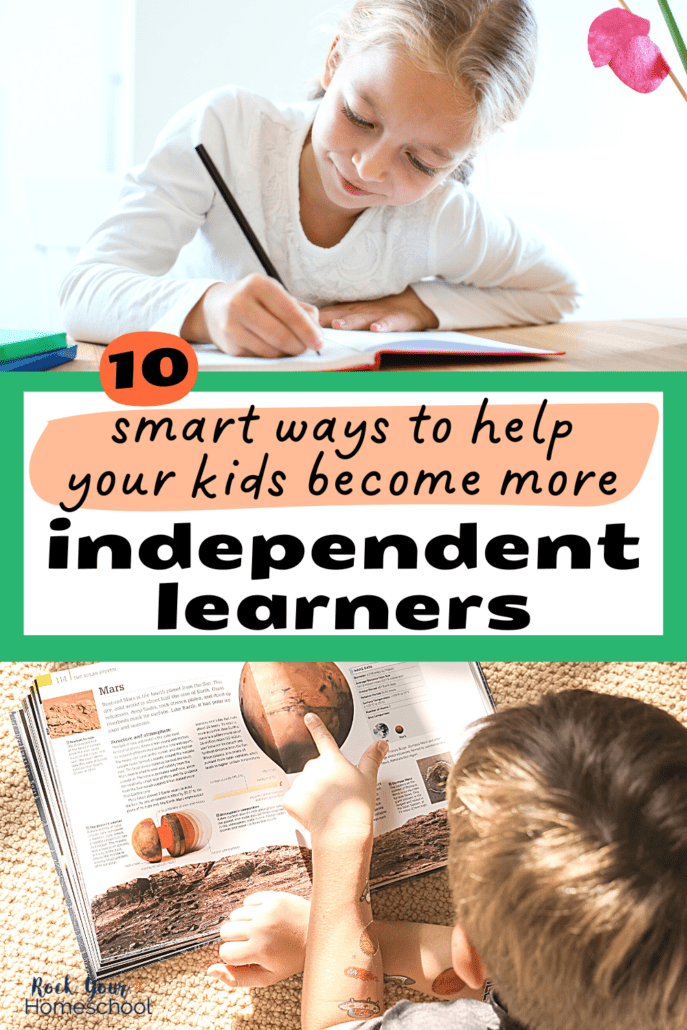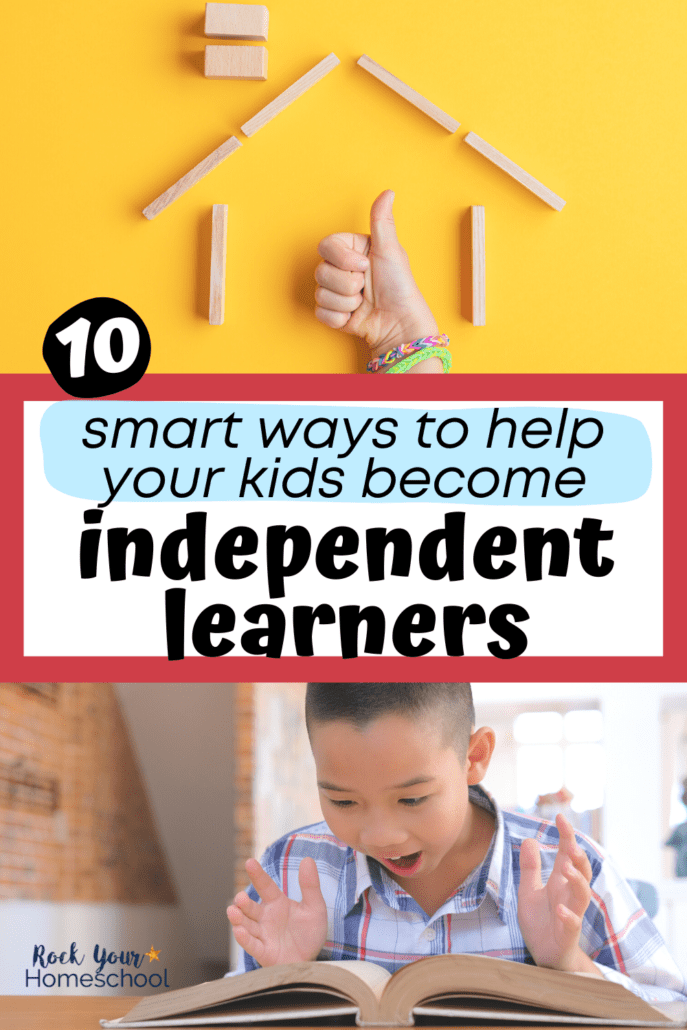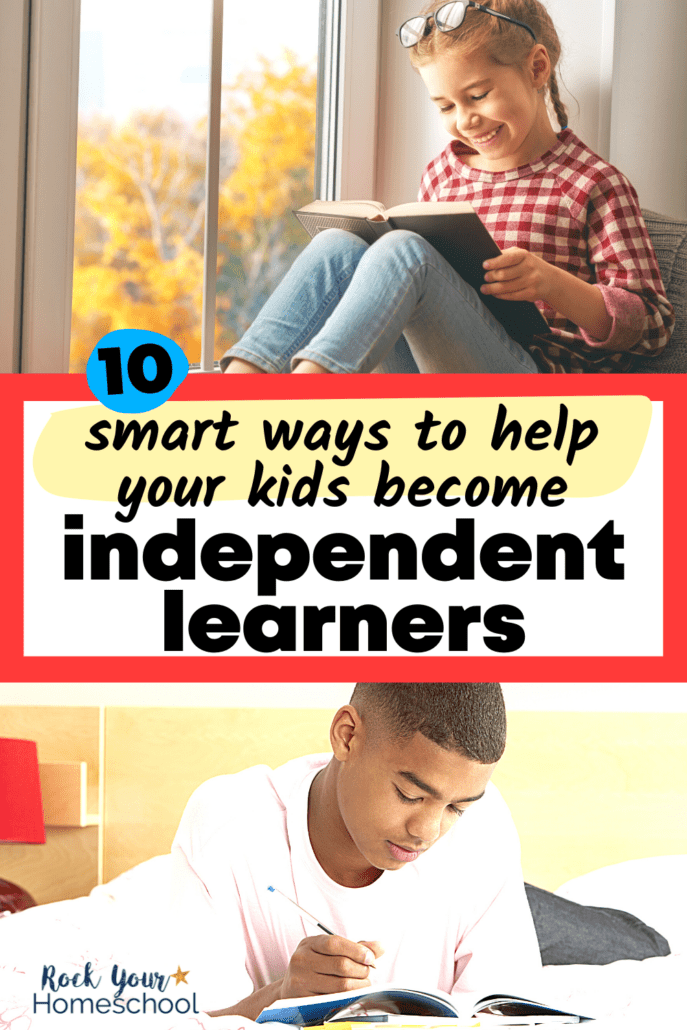10 Smart Ways to Help Your Kids Be Independent Learners
This post may contain affiliate links. Please read my disclosure statement. Thanks for visiting!
Want to take your homeschool to the next level? Help your kids become more independent learners!
You'll be amazed at all the things that your kids can do to take ownership of their learning as they practice essential life skills and more.
Discover how these tips and ideas can empower you to guide your kids in the independent learning process.

One of the Best Things About Our Homeschool
When we started our homeschool journey with 5 boys over 10 years ago, I wasn't sure how long it would continue or what it would look like.
I told myself that we'd take it year by year and check in to see who wanted to keep learning at home and if anyone wanted to return (or try) public school. Much to my surprise, all 5 boys have stuck with our homeschooling adventures.
Now that I have a homeschool high school graduate and a Senior who is preparing for college, I find myself reflecting on the ups and downs of our homeschool experiences. I want to do all that I can to move forward in a positive direction with my younger boys. It's been eye opening to take this time to look at what's worked and what needs tweaked.
There have been so many positives in our homeschooling. My boys have super strong connections with each other. All of my boys come to me to "process" (our word for talking through concerns, thoughts, and feelings) things going on in our homeschool world and beyond.
One of the best things that's happened as a result of our large family homeschool life is that my boys have all become independent learners - taking responsibility for their own learning. I believe their independent learning skills have actually made it possible for our homeschool to continue, be successful, and enjoy positive relationships.
Let's take a look at what I mean by independent learning, its benefits, and how you can encourage your kids to build and practice these skills.

What Does Independent Learning Mean?
Wondering what I mean by "independent learners"? I think it's a great idea to explore!
To me, being an independent learner means:
- Taking ownership of your learning - knowing that you have the power to ask questions, seek help, research, and work (a.k.a. self-reliance)
- Seeking clarity - making sure that you understand what you need to do to complete your assignment, lesson, or other type of work
- Understanding your expectations - getting clear on directions, due dates, how to use materials, and how your work needs to be done
- Becoming better organized - striving to maintain your resources in way that you understand how to use, can easily access, and doesn't interfere with others' materials
- Working on time management - setting realistic personal goals and boundaries to complete tasks
- Respecting others - working quietly and in your own space
- Respecting yourself - keeping your work area tidy, taking small breaks when necessary, and returning to your work with focus and determination
- Motivation - having a drive to push yourself to do better (or find out how to for personal success)
- Self-Monitoring - assessing how you're learning, working, and developing key skills
- Sense of achievement - the ability to recognize how your goal setting is working and to celebrate success
Does my idea of being an independent learner sound lofty or impossible? If so, I completely understand! I never thought that my boys would be able to achieve such skills.
But, here's the thing...ALL of these ideas are a work in progress. These skills are not meant to be perfected or checked off.
In fact, I find myself having to practice and tweak these skills for independent learners as an adult. Maybe you do, too?
To me, independent learners are a work in progress. And it's a good thing to identify as one to work those growth mindset skills as part of your transformation.
An affirmation (positive self-statement) is an awesome way to begin and continue working on mindset for independent learners. Your kids (and you) can say this affirmation aloud and to yourself to practice:
That's just one example of an affirmation for independent learners! Tweak it and use what works best for your students.

The Benefits of Having Independent Learners
Our homeschool life underwent major improvements as each of my boys became more independent learners. These positive changes didn't happen overnight. But, the initial effort and time spend helping my boys learn these skills was well worth the time.
Some of the benefits of having independent learners in your homeschool include:
- Self-starters: If you have early risers (or night owls), your kids can begin their homeschool work without your presence.
- Save time: Your kids will become much more efficient in how they get their work done. Plus, you'll gain time for doing chores, meal prep, even personal reading time.
- Save energy: You'll find that you won't have to nag or herd your kids to the table as much.
- Engaged learners: When your students take ownership of their studies, they are much more likely to stay focused.
- More time for fun, extracurricular activities, and enrichment
- Having a more organized homeschool space
- Improved homeschool confidence (for your kids and you)

10 Smart Ways to Let Kids Take Charge of Their Homeschool Day
With homeschooling, you have both flexibility and freedom. These perks allow you to work with your kids to create a more fulfilling homeschool day (and lifestyle).
These tips and ideas will help boost your homeschool adventures by guiding you as you help your students become more independent learners:
1. Plan with your students
Becoming an independent learner is a process. You don't want to just toss your kids into the deep end and let it be sink or swim.
Chat about your homeschool routine, what subjects are to be studied, and how your week will flow. After talking about the upcoming week, break it all down into days.
As you work on your student's independent learning plans, ask for their feedback and see how you can weave it in.
The most important idea here is to make your kids feel engaged and let them know that their opinion matters. Your kids are more likely to follow through with something if they know they were part of the planning process.
2. Get clear on expectations
Before you let your students loose with their work, make sure to go over your expectations with them. Some things to consider are:
- Where are your kids permitted to do school work? Where should they not do their work? (due to safety concerns, respecting others, etc.)
- Do your students have a specific time limit for completing work? For example, do assignments beed to be done by 3pm to make sure everyone can get to extracurricular activities?
- Would you like your independent learners to begin their work by a specific time? Like, independent learning must begin by 10am.
- Do you have a preference for what types of writing tools and other homeschool supplies that your child uses (or doesn't use)? For example, I don't allow my youngest to use permanent marker for his work at this time. He gets very upset if he can't erase a mistake or start over. This decision helps him calmly continue his work (and prevents me having to step in to squash a meltdown).
- What level of work are you expecting? Provide examples of what is acceptable and what will need to be redone.
- How will your student let you know if they need help? Will you use a code word? What if you're working with another child? What can your student do as they wait?
3. Work with your students on how the day will flow
With independent work, give your students some wiggle room. Let them choose the order of working on subjects.
Having a choice in doing science or history first can go a long way in ownership of one's learning.
If you have a large homeschool family, you may run into this issue (like we did). We use a few online learning programs to boost learning at home. And have a limited number of screens (like laptops, tables, or phones). Instead of letting this become a problem, my boys have been able to work on compromise and time management (other very important life skills!).
4. Let your independent learners choose where to learn and work
If your kids are old enough and you don't have safety concerns, give them the choice of where to read and work on assignments.
Some kids will prefer working in their rooms or other comfortable rooms inside the house.
When the weather is nice, your kids can work outside in the backyard or on the porch. It doesn't matter where they work as long as your kids can maintain focus and complete their tasks.
5. Allow your kids to choose how to spend their free time
As your kids become more independent learners, you may find that they have more free time. And that's totally awesome!
Your kids can explore interests outside of your homeschool. As long as they're not doing stuff that can harm themselves or others, give them some freedom to choose how to spend their free time. Encourage them to do something creative or educational but don't impose anything on them. It's their time to use as they please.
If your kids could use some help coming up with screen-free options, here are some things that I have available for my boys to choose from:
6. Collaborate on expectations and due dates
Remember those expectations that you set for your independent learners? You may find that you need to remind and review. And that's okay - because it opens the door for conversations about those expectations.
If your kids are like my boys, they ask a lot of questions. And often want to know why.
Sometimes, it's fine to provide your reasoning. For other expectations, it might just be because that's your goal or decision.
Due dates can feel tricky. You want to help your kids succeed and learn time management. But, life does happen.
If you've seen your child working hard and simply needs more time to complete the task, revisit that due date and provide extra time.
However, if your child was goofing around and not putting in effort, sticking to the due date (and any pre-agreed upon consequence, like deduction of points) is the responsible thing to do.
7. Encourage free reading (or listening) time
Help your independent learners flex those skills by exploring resources outside of your homeschool.
Every afternoon when our homeschool work is complete, my boys and I share free reading time. It's something that we now look forward to.
During our free reading time, we pick out any book that we want to enjoy. I set a timer (the boys like to see how much they can read during that time and usually ask for more).
This time is special because I'm modeling the importance of reading and they're getting the freedom to pick their reading adventure.
Allow your kids to pick what books they want to read during that time (even comic books, newspaper, magazines). If your child prefers to listen, let them choose an audiobook.
I suggest using a combination of resources that you have in your home and one from your local library.
8. Encourage your independent learners to choose where to go on field trips
Extend the learning fun with field trips.
You can even make it a homeschool project by mapping it all out and saving money for your adventures.
One cool idea is to also work on setting and reaching fitness goals. For example, you can walk for so many minutes a day to get to a destination. Then, go for it!
Field trips can be fantastic rewards for successfully completed independent work.
9. Incorporate chores into the daily schedule of your independent learners
Include chores in your expectations for your independent learners.
Not only will your kids be learning valuable life skills, they'll also be discovering the importance of time management.
You can highlight what needs to be done around the house and delegate tasks to each kid. Or allow them to pick a few to work on that day or week.
10. Supervise, but do not interfere
For your independent learners, your role is supervisory.
Unless your kids need or ask for your help, let them carry on without your interference. No need to hover or show your student how you'd do something.
Gentle reminders to focus are fine. The key is to allow your independent learners to soar.
Raising Independent Learners Can Be Fun & Rewarding
As with many homeschool things, it's a marathon, not a sprint.
Positive change doesn't always happen over night. Or without effort.
I can promise you, however, that the time and energy that you put into helping your kids become independent learners will be paid back tenfold.
And you'll love knowing that your kids are becoming responsible and engaged lifelong learners!
